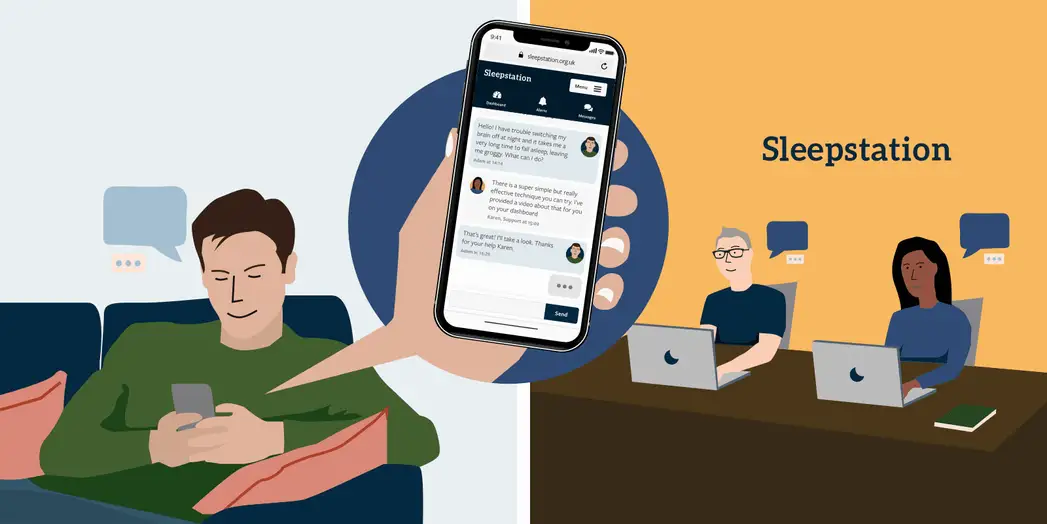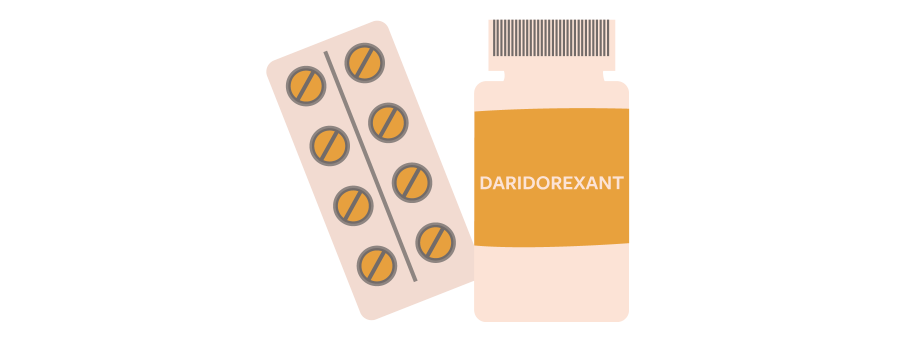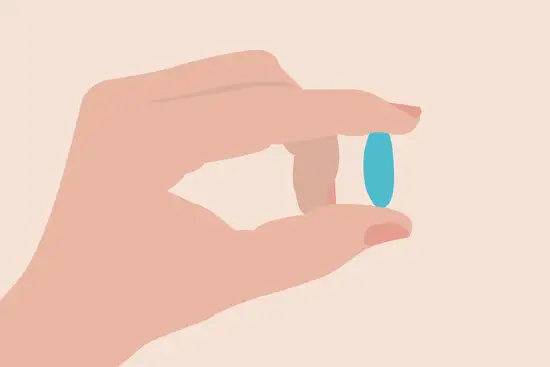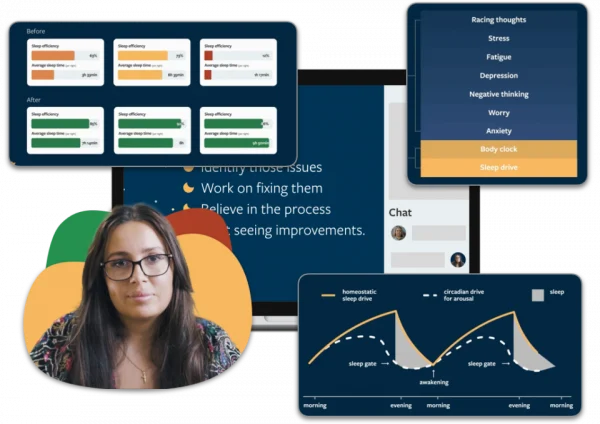Daridorexant — Key points
Daridorexant, sold under the brand name Quiviviq, is a fairly new insomnia drug that works differently to sleep medications you might have heard of before. In this article we’re going to look at just why this is and we’ll explore:
- how daridorexant works
- how to decide if daridorexant is suitable for you
- what side effects you might encounter when taking this drug
- what class of drug daridorexant belongs to
- what’s known about the effectiveness of daridorexant
- how our personalised, drug-free approach may provide a more long-term solution for your insomnia.
Daridorexant’s a little different to conventional sleeping pills
Daridorexant, or Quiviviq, is a relatively new treatment for insomnia. It received approval for use in the US at the start of 2022 and later the same year it was approved for use across the EU too. In the UK it was approved, for a relatively specific use, in late 2023.
It’s particularly interesting because it works in a unique way compared to most of the older insomnia treatments you may have heard of.
We’re going to share with you just what makes daridorexant different from some of the more conventional sleeping pills, what impact it may have if you’re prescribed it and what you should know about this insomnia treatment.
So how does daridorexant work? Let’s find out now.
Sleep better without daridorexant
People who have sleeping problems often turn to daridorexant, hoping for a quick fix. Most people don’t realise that there are more effective ways to treat your sleeping issues without side effects. With Sleepstation you can significantly improve your sleep without relying on medication. Sleepstation will help you:
- fall asleep quickly
- get all the sleep you need
- spend less time awake in bed
- wake feeling refreshed.
Sleep better without daridorexant
Get support from sleep experts, plus self-help tools.
Working with an expert who really grasps your situation is key to unlocking real sleep, effortless sleep. You deserve to sleep well and to work with people who have the right knowledge and expertise to help you get there.
Begin your journey to a lifetime of better sleep with:
- a full week of unlimited access to our highly-trained sleep coaches.
- direct contact and professional advice, with no waiting lists.
- expert insights to control and repair your sleep.
- lifetime access to an ever-growing library of sleep tools and resources.
How does daridorexant work?
Common insomnia drugs like the benzodiazapines (such as temazepam) and the non-benzodiazepine ‘Z-drugs’ (zopiclone, zaleplon, zolpidem) work by encouraging your brain activity to slow down causing you to become sleepy.
But daridorexant is a little different because it instead works by reducing levels of wakefulness. Because of the way that daridorexant works, it’s also considered to have fewer side effects than many of the traditional sleeping pills and a low risk for developing dependence and tolerance.1
To understand how daridorexant does this, we need to know a bit more about the class of drugs it belongs to. So let’s look in a little more detail at the mechanism of action of daridorexant.
Daridorexant belongs to the DORA class of drugs
When explaining how different drugs work, you’ll hear people talking about their mechanism of action. But what does this mean?
A mechanism of action is how the drug works on a molecular level in your body. By looking into the mechanisms of action, we’re able to understand in more detail what a drug’s doing in your body and both how and why it can then affect your sleep.
Daridorexant is a type of drug known as a dual orexin receptor antagonist, or DORA for short. DORAs act by blocking the activity of a chemical in the body called orexin, also known as hypocretin.
The orexin system signals to the wake system to release several chemicals that promote wakefulness. Under normal circumstances, orexin levels rise throughout the day as wakefulness is promoted, and then fall at night, when your brain and body are preparing to sleep.

Daridorexant works by blocking orexin signalling and so reduces wakefulness. It acts like a roadblock, stopping orexin from sending messages to stay awake and keep alert. So by blocking orexin, daridorexant reduces wakefulness and helps you to fall asleep.
And because of its mechanism of action, it’s thought that daridorexant doesn’t affect your sleep architecture, i.e. the percentages and distribution of your sleep stages.2
While daridorexant is the only DORA approved for use in Europe and the UK, there are currently two other DORAs approved in the US for the treatment of insomnia:
- daridorexant (Quviviq)
- lemborexant (Dayvigo)
- suvorexant (Belsomra).
What’s the recommended dosage of daridorexant?
The recommended dosage of daridorexant is 25mg or 50mg to be taken at night.
It’s recommended to take the drug within 30 minutes of going to bed, and making sure you have at least seven hours remaining before you plan to wake up.3 This is to give your body enough time to break down the drug while you sleep, so you shouldn’t experience ‘hangover’ effects from it when you wake up.
Who can take daridorexant?
In the US, daridorexant is approved to treat insomnia in people specifically experiencing difficulties with sleep onset (trouble getting to sleep) or sleep maintenance (trouble staying asleep).3
EU guidelines are slightly different, with daridorexant being approved for the treatment of adults who have experienced symptoms of insomnia for more than three months, with considerable impact to their daytime functioning.4
In the UK, the National Institute for Health and Care Excellence (NICE) recommends daridorexant as a long-term treatment for insomnia, but states that it should be considered as a treatment for insomnia only if:
- you’ve already tried Cognitive Behavioural Therapy for insomnia (CBTi) and it’s not worked
- CBTi wasn’t available or was unsuitable for you.5
The guidance goes on to say that you should take daridorexant for as short a time as possible. If you’re taking it, you should have a medication review within three months of starting and, if it’s not shown to be helping, the medication should be stopped. If you continue to be prescribed it, you should be regularly assessed by your healthcare provider.
Clinical trials have shown daridorexant to be safe for both younger and older adults, although caution is advised if it’s used in people over 75. At present there’s limited information available about its safety in pregnancy or when breastfeeding.
There’s some clinical trial data showing that daridorexant may increase symptoms of depression, so it’s recommended that this drug is used with caution in people who are depressed.6
Can I take daridorexant if I have narcolepsy?
Because of daridorexant’s mechanism of action it’s thought that it could further aggravate the daytime sleepiness seen in people with narcolepsy. If you do have narcolepsy, it would be worth discussing other options with your healthcare provider.2
Daridorexant and obstructive sleep apnea (OSA)
Two studies have looked at the use of daridorexant by people with OSA and their results show that while the drug didn’t improve participants’ apnea symptoms, it did have the potential to improve their sleep.7 8
Taking daridorexant also didn’t negatively affect people’s breathing during the night.
Does daridorexant have side effects?
Taking any drug can come with the risk of side effects, but daridorexant is thought to have fewer side effects than many of the more established sleep medications. The most commonly reported side effects include:
- dizziness
- sleepiness
- fatigue
- headache.
Less common side effects of daridorexant included hallucinations, nightmare, abnormal dreams and sleep paralysis.9
Some people may also experience drowsiness during the day after taking daridorexant especially in the first few days after starting this medication.10

Is it OK to drink alcohol while taking daridorexant?
Guidelines recommend that it’s best to give alcohol a miss while you’re taking daridorexant.10 4 This is because both daridorexant and alcohol are classed as central nervous system (CNS) depressants which is a term used to describe drugs and other compounds that can slow down brain activity. So if you combine the two, you’re more likely to experience side effects such as feeling dizzy, drowsy or confused.
Drug interactions with daridorexant
It’s not only alcohol that can interact with daridorexant. If you take it with any other CNS depressants you might experience additive effects from taking the two together. Some commonly prescribed CNS depressants can include:
- tricyclic antidepressants
- benzodiazepines
- opioid painkillers.
Daridorexant can also interact with a number of other classes of drugs:
Can I drive the morning after taking daridorexant?
Researchers have looked at how taking daridorexant in the evening could affect people’s ability to drive (in a driving simulator) the next day. These types of experiments are useful because they can show how daridorexant could affect daytime functioning.
In a study of adults, without insomnia, aged between 50-79 years, it was shown that an initial dose of 50mg caused a significant impairment in their driving ability the next day. However, this effect was absent after four days of dosing.11
So, what does this mean for you? If you’re prescribed daridorexant, it’s worth being mindful of how you feel the morning after taking it, particularly at the start of your treatment. While your body should adapt to the drug in a few days, you should speak to your doctor if you feel like your daridorexant dose is affecting how you feel in the mornings after taking it.
Tolerance, dependence and rebound effects of daridorexant
With many sleep medications, your body can develop tolerance to the drug over time and you can find it no longer helps you to sleep. When this happens, you can need a higher dose to achieve the desired effects.
This is what’s meant when we talk about tolerance to a drug. Your body becomes tolerant to the drug and so it doesn’t work at that dose anymore.
With daridorexant, studies so far haven’t found evidence of tolerance. It should be noted though that it’s still a fairly new drug, so studies will continue to examine this over longer time periods.
Another concern is the chance of becoming dependent on a drug. This is when you become reliant on it to sleep and if you don’t take it, you won’t sleep. Studies have shown that even after taking daridorexant for a year, people didn’t show signs of dependence.12
With many medicines for sleep, insomnia symptoms may return once you stop taking the drug. This is known as rebound insomnia. Data about daridorexant suggests that there isn’t a rebound effect when you stop taking this drug even after having taken it for twelve months.13
It is worth nothing that, as with many other sleeping tablets, daridorexant is a schedule 4 controlled substance. This is because there is some risk for misuse or abuse with this drug.14
Are there better options to treat my insomnia?
While studies appear to show that daridorexant is a safe and effective treatment option for insomnia, it’s only recommended for use short-term.
And as with any drug-based insomnia treatment, it can’t address the root cause of why you’re sleeping badly. Treating insomnia with drugs is a one-size-fits-all method because sleeping pills don’t approach your problem individually.
Sleepstation can help you to uncover what’s behind your specific sleep problem. We take the time to listen to you individually and we look in-depth at how you’re sleeping.

By building a clear picture of your problem sleep and the effect it’s having on your mood and your daily life we can then tailor a sleep improvement plan to provide you with the tools, knowledge and personalised support you need to get your sleep back on track.
Our approach is backed by decades of solid science, it’s clinically approved and highly effective. It doesn’t matter if you’ve been sleeping badly for a month or a decade, the therapy offered in our digital sleep clinic where we provide a range of services that can help you based on the severity of your sleep problem and the level of support you need.
Tired of relying on medication for sleep?
If you’ve been prescribed sleeping medication but are looking for a solution that can get you back to sleeping naturally, we can help. Our clinically-proven sleep improvement programme can get you falling asleep quicker, staying asleep longer and all without having to rely on sleeping pills, in just a few short weeks.
You don’t have just to take our word for it either, we’ve helped thousands of people just like you to take back control of their sleep and you can see what they have to say about Sleepstation’s digital sleep clinic yourself.
So if you’re ready for a drug-free way to overcome insomnia, with long-lasting results, why not try take our short questionnaire and see just how Sleepstation can help you get back to sleeping soundly in just a few short weeks.
Summary
- Daridorexant is one of a relatively new class of drugs that have been developed for the treatment of insomnia.
- Its mechanism of action differs from many of the older insomnia treatments.
- Studies have shown that it can help people to fall asleep faster at night and stay asleep longer during the night.
- Like all drug treatments, there’s a risk of unwanted side effects when taking daridorexant.
- Daridorexant may help you sleep but pills can’t get to the root of your individual sleep problem.
- Our sleep therapy offers you a personalised approach to understanding why you’re sleeping badly and helps you rebuild healthy sleep in just a few short weeks.
References
- Robinson CL, Supra R, Downs E, Kataria S, Parker K, Kaye AD et al. Daridorexant for the treatment of insomnia. Health Psychol Res 2022; 10. ↩︎
- Sarathi Chakraborty D, Choudhury S, Lahiry S. Daridorexant, a recently approved dual Orexin receptor antagonists (DORA) in treatment of insomnia. Sleep Sci 2023; 16: 256–264. ↩︎
- Markham A. Daridorexant: First approval. Drugs 2022; 82: 601–607. ↩︎
- Quviviq. [Internet] Europa.eu. (accessed 7 Mar 2024). Available here. ↩︎
- Daridorexant for treating long-term insomnia. [Internet]. Nice.org.uk (accessed 27 Nov 2023). Available here. ↩︎
- Division of Risk Management. [Internet] Fda.gov. (accessed 7 Mar 2024). ↩︎
- Boof M-L, Dingemanse J, Lederer K, Fietze I, Ufer M. Effect of the new dual orexin receptor antagonist daridorexant on nighttime respiratory function and sleep in patients with mild and moderate obstructive sleep apnea. Sleep 2021. ↩︎
- Boof M-L, Ufer M, Fietze I, Pépin J-L, Guern A-S, Lemoine V et al. Assessment of the effect of the dual orexin receptor antagonist daridorexant on various indices of disease severity in patients with mild to moderate obstructive sleep apnea. Sleep Med 2022; 92: 4–11. ↩︎
- Highlights of Prescribing Information: Quiviviq. [Internet] Idorsia.us. (accessed 7 Mar 2024). Available here. ↩︎
- Daridorexant https://bnf.nice.org.uk/drugs/daridorexant/ (accessed 27 Nov 2023). ↩︎
- Muehlan C, Brooks S, Vaillant C, Meinel M, Jacobs GE, Zuiker RG et al. Driving performance after bedtime administration of daridorexant, assessed in a sensitive simulator. Clin Pharmacol Ther 2022; 111: 1334–1342. ↩︎
- Leger D, Fietze I, Pain S, Kinter DS, Flamion B, Mignot E. 348 Absence of withdrawal symptoms and rebound insomnia upon discontinuation of daridorexant in patients with insomnia. Sleep 2021; 44: A139–A139. ↩︎
- Kunz D, Dauvilliers Y, Benes H, García-Borreguero D, Plazzi G, Seboek Kinter D et al. Long-term safety and tolerability of daridorexant in patients with insomnia disorder. CNS Drugs 2023; 37: 93–106. ↩︎
- Drug Enforcement Administration. Schedules of controlled substances: Placement of daridorexant in schedule IV. Federal Register. 2022; 87: 20313–20318. ↩︎




